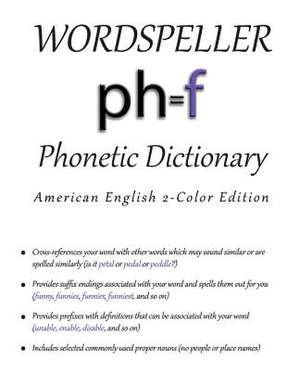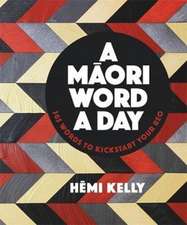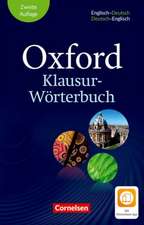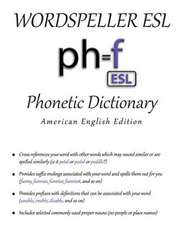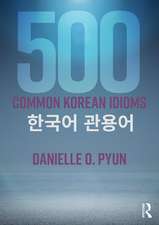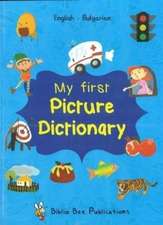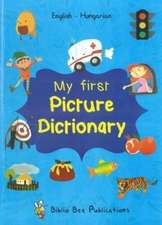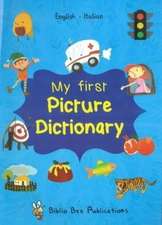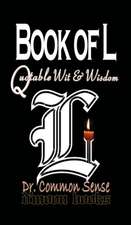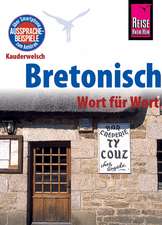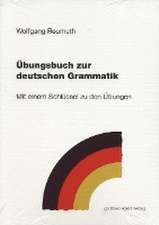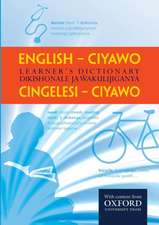Wordspeller Phonetic Dictionary
Autor Diane M Franken Limba Engleză Paperback – 19 mai 2015
Preț: 267.66 lei
Nou
Puncte Express: 401
Preț estimativ în valută:
51.22€ • 53.62$ • 42.38£
51.22€ • 53.62$ • 42.38£
Carte tipărită la comandă
Livrare economică 05-19 aprilie
Preluare comenzi: 021 569.72.76
Specificații
ISBN-13: 9780983038146
ISBN-10: 0983038147
Pagini: 462
Dimensiuni: 191 x 235 x 25 mm
Greutate: 0.86 kg
Editura: IMPRESS
ISBN-10: 0983038147
Pagini: 462
Dimensiuni: 191 x 235 x 25 mm
Greutate: 0.86 kg
Editura: IMPRESS
Notă biografică
Diane Frank, born in 1959 had served in the military, been a pilot, hot glass artist, carpenter, sheetmetal fabricator, tile setter, grantwriter and single mother of 2 when it all came to a stop when injured in an accident in 1996 (a story she relates in her dictionaries). In this transition between being self-empowered to completely powerless, she unknowingly adopted a new role as lexicographer. Inspired by her daughter who struggled with spelling throughout her education due to her challenge with dyslexia, Diane set about developing a methodology for a word speller, something she was compelled to manage while confined to a bed for nearly 2 years. This word speller was to be based on the phonetic pronunciation of a word intended not only to help her daughter who spelled words by the way they sound, but to help other's struggling to locate a misspelled word quickly and effortlessly without embarrassment or doubt. As the methodology evolved she realized the word speller must also incorporate a dictionary. When encountering homophones and confusable words how, other than by defining each word, would anyone differentiate as to which word was which? She became taxed with not only providing misspelled words and their correct spellings but their definitions as well. How would someone differentiate between a word 'spelled the same' but had other meanings (such as spoke, right or wear)? Or how about words that sound the same but are spelled differently (they're, their, there)? Adding suffixes to those words became necessary as well. If you are irate, can you be iratable? If you have ski's are you going sking? And do you drop the 'e' or 'y' to add an 'ing'? How do people who don't have the luxury of 12 years of English education manage these invisible rules? Suffixes - Diane researched via 6 dictionaries to make certain she had acquired every conceivable suffix available for each root word to become engrained into the word speller. Does any resource tool do this? Her study of Latin for 3 years taught her that knowing the definition of a prefix was halfway to knowing the meaning of a word. She then implanted every available prefix plus their definitions into each word speller. While developing the methodology for the phonetic dictionary she became overwhelmed to learn there were over 500 ways to misspell words such as 'physician', realizing she must be selective as to which misspellings would be allowed into print due to the cost of printing and purchasing a book. As she prepared for publishing, over 1/2 of her database had to be removed to keep the book to a manageable 500 pages. Her completed work, "Gabby's Wordspeller & Phonetic Dictionary" was the first phonetic dictionary ever written this century and published in 2008. By 2010, her dictionaries, without advertising, were already distributed to over 11 countries and 800 school districts. Still, Diane was challenged with what to do with over 1/2 of the dictionary that had not been printed but could be useful to those challenged with spelling. In her travels to Mexico in 2008 by invitation to introduce the dictionary to the Universidad de Colima, she learned that Mexicans were very eager to purchase the book. But felt it was inadequate in breadth since many Spanish letters are transposed in English. She then began to compile, with the help of a Mexican translator, lists of misspelled words in Spanish for incorporation into yet another dictionary for Latino's learning English for the first time. In 2010 she had amassed an additional 40 pages of misspelled Spanish words which proved, once again, to be daunting as the database grew more monstrous when combined with half the database that remained unpublished. At this time Diane made a decision to turn towards developing Apps which could handle a sizeable database. In 2012, the Apps became available to digital devices.
